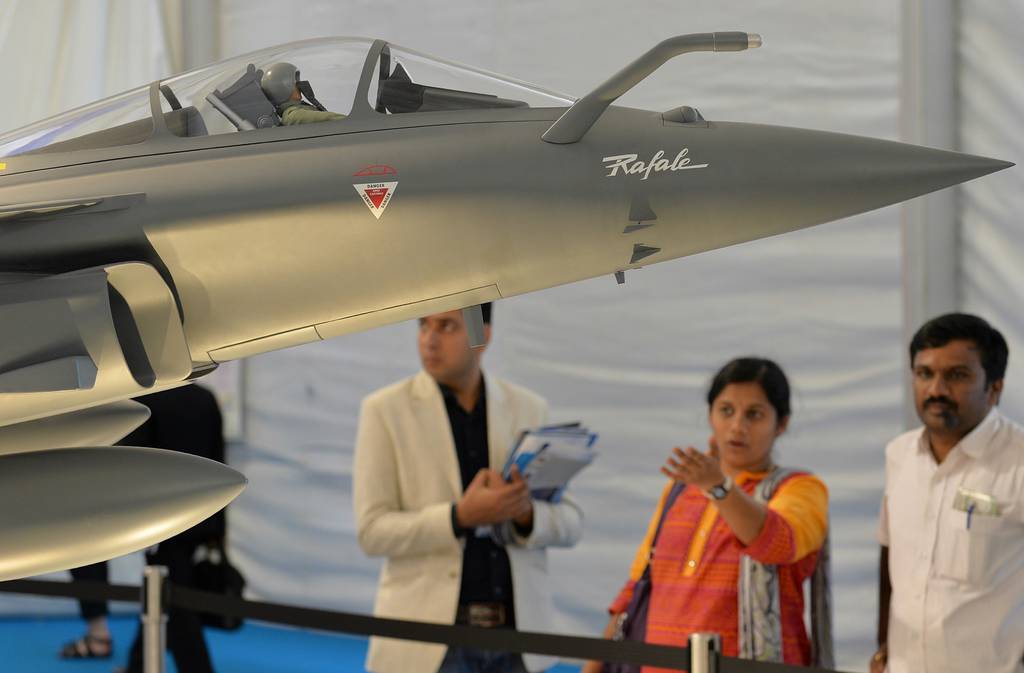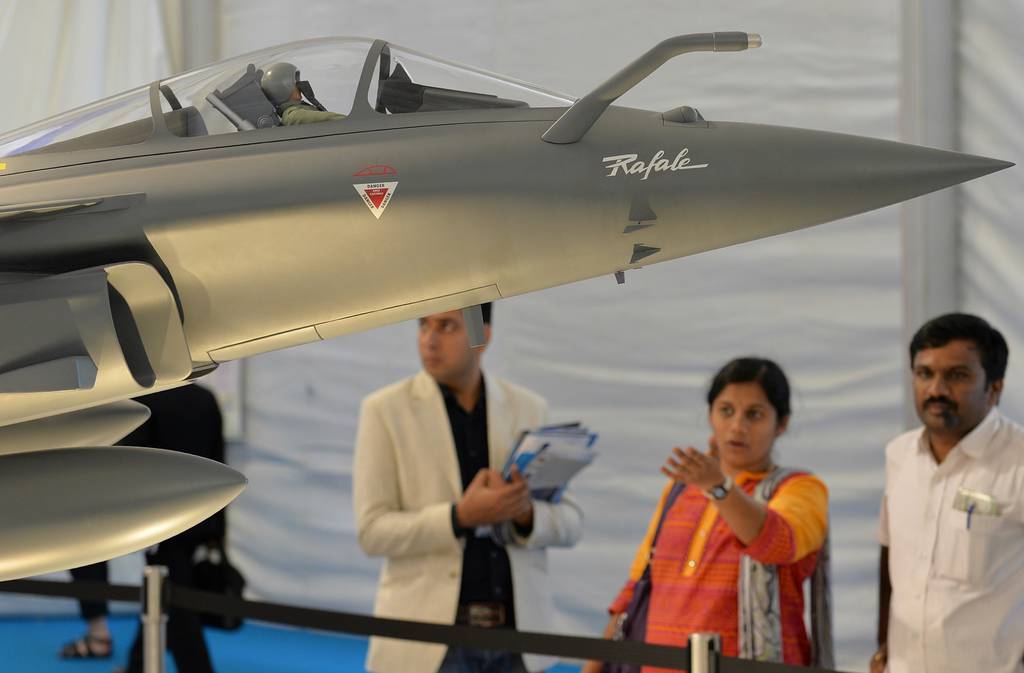Industry
Indian government clashes with foreign defense sector over offset demands
By Vivek RaghuvanshiApr 21, 05:32 PM

NEW DELHI — About half of India’s offset obligations, which are worth $13.52 billion across a set of 57 contracts, have resulted in either penalties or the threat of them, Defence Ministry officials told Defense News.
The government has imposed penalties on several original equipment manufacturers from 2013 to 2021 for defaulting on their offset obligations, potentially deterring foreign defense companies from seeking business in the country. Those penalized OEMs include:
- Lockheed Martin (a U.S.-based company) during work related to C-130J Hercules aircraft.
- Textron (U.S.) for a Sensor Fuzed Weapon contract.
- Safran (France) during a Mirage aircraft upgrade project and the acquisition of Rafael aircraft.
- Dassault Aviation (France) during a Mirage upgrade project.
- Thales (France) during a Mirage upgrade project and rocket-related efforts with Hindustan Aeronautics Limited.
- European consortium MBDA for an effort involving MICA missiles for the Mirage-2000H and during the Rafael acquisition.
- Rosoboronexport (Russia) for contracts related to Kamov Ka-28 helicopter upgrades, MiG-29 fighter jet upgrades and Mi-17 helicopters.
- Fincantieri (Italy) for work on a fleet tanker.
- Pilatus Aircraft (Switzerland) during efforts related to the PC-7 MkII basic trainer aircraft.
- Israel Aerospace Industries for contracts involving Harop and Heron drones.
Offsets are compensation a buyer seeks from a seller for the purchase of goods or services. These can range from co-production agreements to investments in local partners to technology transfer.
In India, offsets are supervised by the ministry’s Defence Offset Management Wing, DOMW, which monitors the implementation of deals between original equipment manufacturers and domestic enterprises, the latter of which serve as local partners. However, the country is in the process of eliminating offsets.
“Without going into the merits of individual cases, it appears that several defense contractors have failed to fulfill their legally binding offset obligations, resulting in a levy of penalties,” Vivek Rae, a former chief of acquisitions for the MoD, told Defense News.

A security official stands at his post near the Defence Ministry during a foggy morning in New Delhi, India, on Jan. 22, 2020. (Jewel Samad/AFP via Getty Images)
The government’s offset policy, he added, has been difficult to implement. But ministry officials told Defense News original equipment manufacturers failed to meet offset requirements due to their own lack of performance. The officials, who spoke on the condition of anonymity because they were not authorized to speak to the media, said the government’s process is flexible and allows changes to be made to local partnerships and offset products.
MoD officials noted OEMs are now permitted to submit their respective offset plans a year before discharge. Previously, a complete offset plan had to be submitted when the primary and offset contracts were signed.
Defense News contacted several OEMs who were penalized for defaulting on offset terms, but they refused to be identified for this story over concerns it would upset their prime customer — the Defence Ministry. However, some OEMs blamed the government for delays in offset implementation, citing excessive and inflexible regulations as well as a lack of expertise and accountability within the DOMW.
Any offset policy where one of every two contracts is penalized and forbids contracts signed since 2007 to close will harm a country’s ability to conduct business, warned Mayank Patel, the managing director of Tri Polus, a London-based consultancy specializing in offsets.
In the last five years, there were 21 contracts where offset obligations were unfulfilled on time. The minister of state for defense, Ajay Bhatt, told lawmakers April 4 the MoD has so far imposed a total of $43.5 million in penalties from 16 of those contracts.
Deepak Sangha, a former executive with MBDA’s British arm, said India’s approach to offsets does not economically benefit the nation and its defense industry in the long run. Sangha said OEMs face a lack of government flexibility when seeking minor deviations from stated or perceived guidelines. Moreover, penalties harm their reputations and could negatively impact opportunities elsewhere, he added.
Industry war games
Insighteon Consulting, a Delhi-based analytics firm, conducted a war game Feb. 23-24 on penalization cases related to India’s offset contracts. It found that in a majority of cases, an unfulfilled offset deal that led to a penalty was due to either overambitious offset programs or ambiguity in policies.The firm also determined a trust-based relationship and flexibility in offset guidelines would have largely reduced penalties.
Rajiv Chib, a partner at Insighteon, said war game experts recommended that in legacy situations, where offsets contracts have long expired, the suppliers (or OEMs) should be given a second chance to fulfill their offset obligations.

Insighteon Consulting conducted a war game that found in a majority of cases, an unfulfilled offset deal that led to a penalty was due to either overambitious offset programs or ambiguity in policies. (gedzun/Getty Images)
Chib also recommended the ministry create an empowered dispute-resolution body, led by a senior bureaucrat or senior industry professional, to facilitate that second chance.
The body’s objective would be to close all expired offset contracts — largely from before 2012 — and achieve the best possible outcome, as DOMW may find it difficult to play the role of both facilitator and arbitrator. An OEM’s second chance would come under a new broad policy framework, where the company is allowed to fulfill its offset obligations according to provisions from any Defence Procurement Procedure or Defence Acquisition Procedure governmental documents.
Levying penalties
According to the MoD’s offset guidelines, if a vendor fails to fulfill its offset obligation in a particular year in accordance with the annual discharge plan, a penalty equivalent to 5% of the unfulfilled offset obligation will be levied on the vendor. The unfulfilled offset value will then be readjusted over the remaining period of the contract.The offset policy says the penalty may either be paid by the vendor, recovered from the bank guarantee of the main procurement contract, deducted from the amount payable under the main procurement contract or recovered from the performance bond of the offset contract.
The policy also says any vendor failing to implement offset obligations could be banned from participating in future defense contracts for up to five years.
The MoD changed the offset threshold — the minimum contract value before offsets deals are considered — from $46 million to $305 million in 2016 under defense procurement rules; from 2020 onward, offsets were excluded from government-to-government deals.
This will eventually eliminate offsets related to Indian military procurement. However, implementation of present contracts will continue up to 2033.
India introduced its offset policy in 2005. In the initial years, small companies executed defense exports through offsets; the majority of those businesses specialized in information technology or engineering.
Later on, several manufacturing companies got a chance to export components and subassembly parts, particularly in the aerospace sector. The policy focused on compelling equipment suppliers to include local companies in their global supply chains.
Today, 220 domestic companies are listed with the MoD as Indian offset partners.
About Vivek Raghuvanshi
Vivek Raghuvanshi is the India correspondent for Defense News.
Share:
More In Industry

Longtime Fincantieri CEO Bono to step down
Speaking to Italian publication L’Espresso, Giuseppe Bono said his mandate was not being renewed by the Italian government due to his age, adding that he “respected” the decision.

SpaceX shut down a Russian electromagnetic warfare attack in Ukraine last month — and the Pentagon is taking notes
“The next day, Starlink had slung a line of code and fixed it," said Pentagon electronic warfare director Dave Tremper. "And how they did that was eye-watering to me."

Pentagon seeks reauthorization, expansion of small business funding
The Pentagon is pursuing the reauthorization and expansion for programs meant to boost small business participation in defense research, set to expire Sept. 30.

AeroVironment wins $20M contract for hand-launched drone for Ukraine
The Defense Department has awarded the first contract of the Ukraine Security Assistance Initiative’s $300 million budget for this year, a $19.7 million deal with AeroVironment for a small, hand-launched surveillance drone called the RQ-20 Puma AE.
Featured Video
0 seconds of 2 minutes, 21 secondsVolume 0%
Check out the Navy's extended-range, air-defense-killing missile

Black sailors still dealing with shaving policies | Defense News Weekly Full Episode 4.16.22

Money Minute — Tax deadline is almost here, what should I do?

No Sh*t, There I Was... a young Marine investigating an embarrassing incident
Trending Now
SpaceX shut down a Russian electromagnetic warfare attack in Ukraine last month — and the Pentagon is taking notes
Army chooses Sig Sauer to build its Next Generation Squad Weapon
Indian government clashes with foreign defense sector over offset demands
AeroVironment wins $20M contract for hand-launched drone for Ukraine
US Army document details plan to update WWII-era ammo plants and depots

Indian government clashes with foreign defense sector over offset demands
About half of India’s offset obligations across a set of 57 contracts worth $13.52 billion have resulted in either penalties or the threat of them, hampering the ability of foreign defense companies to do business in the country.


